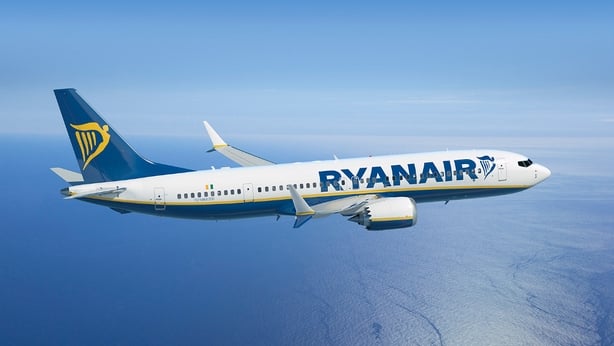Ryanair's average fares fell more than expected in the last three months of 2016 amid a glut of capacity in Europe's short-haul aviation market.
But the low-cost airline said it remains on track to post a modest increase in annual profits.
Ryanair, Europe's largest airline by passenger numbers, said average fares fell 17% in the three months to December 31 and could fall up to 15% in the three months to March 31.
That is worse than its earlier forecast of a fall of between 13-15% over the six-month period.
Weak fares knocked its profit in the final three months of 2016, the third quarter of its financial year, by 8% compared to last year to €95m. This compared to a forecast of €99m.
But Ryanair said it remained confident of meeting its profit guidance for its financial year to March 31 of €1.3-1.35 billion, which would imply an increase of around 7% on last year.
"It seems clear that pricing [in the year to end-March 2018] will continue to be challenging and we will respond to these adverse market conditions with strong traffic growth and lower unit costs," Ryanair's chief executive Michael O'Leary said in a statement.
"We expect our strategy will win market share from all higher cost EU competitor airlines, while we continue to open new markets," he said.
The airline, which is focusing on market share rather than profit per passenger, increased its passenger numbers in the last three months of 2016 by 16% to 29 million and further cut the number of empty seats on its planes.
It plans to grow capacity by 13% this winter compared to an industry average increase of around 9% - the highest level of capacity growth in the industry in a decade.

Ryanair said its costs per passenger were down 12% in its third quarter, half of that due to fuel. Unit costs for the full year to March 31 will fall by around 4%, it said.
Europe's short-haul carriers have struggled in recent months with overcapacity and Britain's vote to leave the European Union, with low-cost rivals Wizz and EasyJet both trimming their annual profit forecasts in recent weeks.
On Brexit, Michael O'Leary said that the uncertainty caused by the UK's decision to leave the European Union will continue to represent a challenge for Ryanair for the rest of 2017 and all of 2018.
Mr O'Leary said he expects sterling to remain volatile for some time and a slowdown in economic growth in both the UK and Europe as Brexit gets closer.
"While there may be opportunities to expand at certain UK airports (such as the recent extension of our growth deal at Stansted), we expect to grow at a slower pace than previously planned in the UK and will continue to switch capacity into other key markets around Europe," he added.
During the three month period, Ryanair said it launched 95 new routes and opened five new bases at Bucharest, Hamburg, Nuremberg, Prague and Vilnius.
In March, the airline opened a further two new bases - Frankfurt Main and Naples.
Ryanair shares fell in Dublin trade today.

